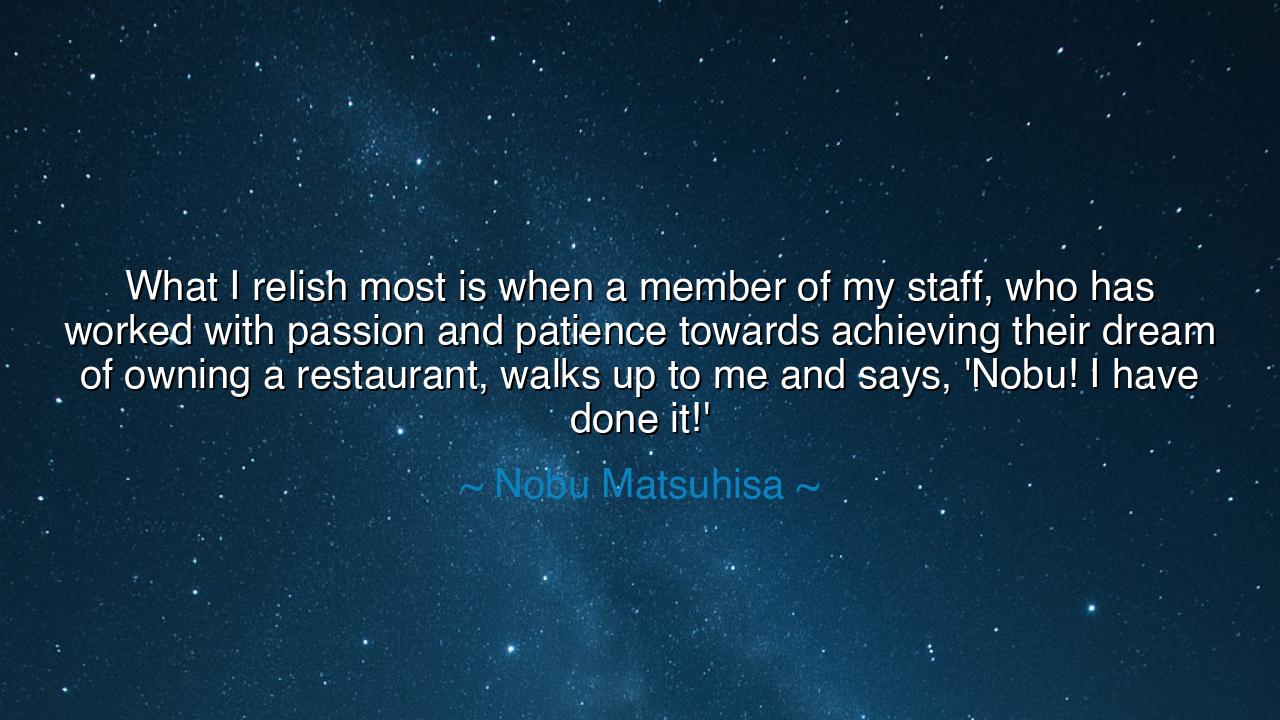
What I relish most is when a member of my staff, who has worked
What I relish most is when a member of my staff, who has worked with passion and patience towards achieving their dream of owning a restaurant, walks up to me and says, 'Nobu! I have done it!'






Nobu Matsuhisa, the great chef and founder of a worldwide culinary empire, once spoke these stirring words: “What I relish most is when a member of my staff, who has worked with passion and patience towards achieving their dream of owning a restaurant, walks up to me and says, ‘Nobu! I have done it!’” Though spoken in the realm of kitchens and dining tables, this saying is not about food alone. It is about the eternal flame of dreams, the power of mentorship, and the sacred joy of seeing others rise to greatness. Nobu speaks as one who knows that true glory does not come from what we keep, but from what we give, and that the highest honor of the master is the triumph of the student.
Consider first the word passion. It is the fire that drives men and women to labor beyond fatigue, to endure hardship without surrender. In the world of the chef, where hours are long and the body is tested by heat, knife, and endless repetition, only passion sustains the soul. Nobu recognizes this spark in his staff, for he too once bore it as a young man in Japan, dreaming of flavors that would one day captivate the world. Without passion, no dream can ever be born into reality. But passion alone, like fire untamed, may consume. Thus, Nobu also praises patience—the steady hand that shapes fire into light and warmth.
Patience is the virtue that tempers haste, the slow and deliberate seasoning that brings depth to life’s dish. Many apprentices yearn to leap too quickly into glory, but Nobu teaches that the path to mastery is walked step by step, service by service, mistake by mistake. Just as rice must be washed, steamed, and cooled with care before it becomes the heart of sushi, so too must a dream be cultivated with restraint, humility, and time. In this, his words echo the wisdom of the ancients: that to harvest too soon is to gather bitterness, but to wait with patience is to reap sweetness.
A living example of this truth lies in the story of Genghis Khan’s generals. Many began as simple herdsmen or servants, but under his guidance, through years of discipline and loyalty, they rose to command armies and govern lands. Their triumph was not only their own but also the reflection of their master’s greatness. So it is with Nobu’s disciples. When they come to him and declare, “I have done it!” they do not merely celebrate personal success. They proclaim the triumph of the lineage, the fulfillment of years of shared labor, and the flowering of the seeds Nobu himself once planted.
This is why Nobu relishes such moments more than any personal accolade. He understands that the truest measure of a leader is not the number of crowns upon his own head, but the number of torches he has lit in others. To see a former apprentice open their own restaurant, to watch them step into their destiny—this is the master’s immortality. For the name of Nobu may endure not only in his own establishments but in the lives and successes of those he has inspired. This is legacy: not statues of stone, but living dreams carried forward in the hearts of men and women.
What, then, is the lesson for us who hear these words? It is that we must hold fast to both passion and patience as we pursue our own dreams. We must work diligently, even when the hours are long, even when recognition is absent. And we must also lift others as we climb, for there is no greater joy than to see those whom we have guided rise into their own light. Nobu reminds us that greatness shared is greatness multiplied, and that the circle of life is completed when the student becomes the master.
Therefore, children of the future, remember this teaching. Cultivate your dreams with fire in your heart and steadiness in your hand. Seek out mentors, and when your time comes, become a mentor yourself. Celebrate not only your own triumphs but the triumphs of those you have helped along the way. Let your work be more than a ladder for your own ascent; let it be a bridge upon which many may pass into their destiny. In doing so, you will taste the sweetest joy of all: the cry of another soul who comes to you and says, “I have done it!”






AAdministratorAdministrator
Welcome, honored guests. Please leave a comment, we will respond soon